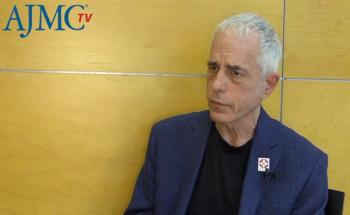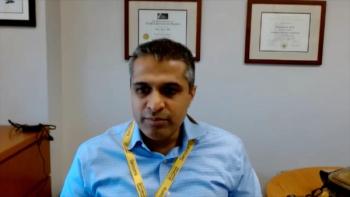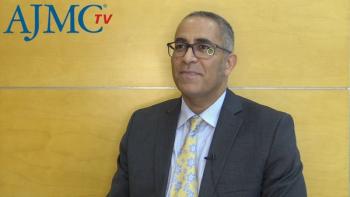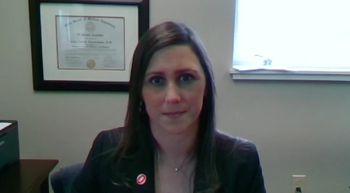
Peer and survivorship support are lacking for patients living with multiple myeloma, leading investigators to evaluate a group-focused multidisciplinary intervention that encompassed physical and mental activities.

Maggie is a senior editor for The American Journal of Managed Care® (AJMC®) and produces written, video, and podcast content covering several disease states. She joined AJMC® in 2019, and has been with AJMC®’s parent company, MJH Life Sciences®, since 2014, when she started as a copy editor.
She has a BA in English from Penn State University. You can connect with Maggie on LinkedIn.

Peer and survivorship support are lacking for patients living with multiple myeloma, leading investigators to evaluate a group-focused multidisciplinary intervention that encompassed physical and mental activities.

In this interview from our coverage of the European Hematology Association 2024 Congress, we spoke with Brian Koffman, MDCM, DCFP, FCFP, DABFP, MSEd, executive vice president and chief medical officer of the CLL Society and himself a survivor of chronic lymphocytic leukemia (CLL), to discuss treatment advancements and the importance of addressing both unmet needs and patient treatment preferences.

Against the backdrop of a case report, pembrolizumab was investigated as immunotherapy for undifferentiated pleomorphic soft tissue sarcoma.

We recently spoke with Tycel Phillips, MD, associate professor, Division of Lymphoma, Department of Hematology & Hematopoietic Cell Transplantation, City of Hope, about his team’s interim analysis of their dose-escalation study of glofitamab against relapsed/refractory B-cell non-Hodgkin lymphoma.

In this final segment of our interview with Ontada's Jessica K. Paulus, ScD, she explains how her team's data presented at the American Society of Clinical Oncology annual conference may translate to the real world.

Patient outcomes in this trial were compared between the regimens of lenalidomide, bortezomib, and dexamethasone and daratumumab, lenalidomide, bortezomib, and dexamethasone for use against multiple myeloma (MM).

This new analysis incorporated 1997-2013 data on patients with a history of surgical resection of stage IIIA-N2 non-small cell lung cancer (NSCLC) and their postop complications to evaluate the possibility of better identifying future surgical candidates.

To conclude our interview with him, Ravin Ratan, MD, MEd, of MD Anderson, explains the importance of caring for all patients and why he tries to own the process of patients feeling confident that they received the attention they deserve.

The American Society for Preventive Cardiology (ASPC) 2024 Congress on CVD Prevention will take place August 2-4 in Salt Lake City, Utah.

In the final part of our interview with Joseph Mikhael, MD, MEd, FRCPC, FACP, he addresses how patients who experience an early relapse of their multiple myeloma are predisposed to worse outcomes.

In our ongoing interview with Jessica K. Paulus, ScD, Ontada, she explains potential drivers behind changing trends in care for lung cancer that may have been influenced by the COVID-19 pandemic.

Investigators compared cost-effectiveness of the KRAS inhibitor sotorasib against the taxane docetaxel in the second line for non–small cell lung cancer (NSCLC).

Dedifferentiated liposarcoma is a fast-growing and more aggressive type of soft tissue sarcoma that originates as a well-differentiated sarcoma and has a typical diagnosis age of 40 to 60 years.

In part 2 of our interview with Suzanne Lentzsch, MD, PhD, Columbia University's College of Physicians and Surgeon, she touches on potential new therapies, important clinical considerations, and treatment challenge for relapsed/refractory multiple myeloma.

In part 3 of our interview, Jessica K. Paulus, ScD, Ontada, addresses the importance of understanding data sources and their impact on clinical research.

The field of sarcoma study is getting more specific, with clinical investigations drilling down to more specific subtypes of soft tissue sarcoma for better targeted therapies.

In this interview from our coverage of the European Hematology Association 2024 Congress, Joseph Mikhael, MD, MEd, FRCPC, FACP, International Myeloma Foundation, discusses the complex principles that underlie treating multiple myeloma (MM) in the US.

In this fifth, and final, special bonus episode of our Pride Month series, we speak with Lauren Albrecht, director of advocacy and organizing, and Layla Orlando, director of health equity and wellness, at Garden State Equality, the largest lesbian, gay, bisexual, transgender, queer, plus advocacy organization in New Jersey.

Patients in this analysis were treated between 2007 and 2020 and could have received radiotherapy either before or after surgery for soft tissue sarcoma (STS).

In our fourth Pride Month podcast episode, we are speaking with Domenico Ruggerio, executive director of We Are Family, in Charleston, South Carolina, the state's oldest nonprofit to provide life-affirming and life-saving programs for lesbian, gay, bisexual, transgender, queer, plus (LGBTQ+) youth.

“The screening victory there is going to take some more time to show its benefit at the population level,” notes Jessica K. Paulus, ScD. “Some of these things are just going to be reductions in mortality that we have to wait to observe over time.”

This investigation sought to expand knowledge of the impact of comorbid pulmonary hypertension (PH) on diagnosed non–small cell lung cancer (NSCLC), using data from adult patients treated at military hospital facilities within the US.

Accelerated approval was originally granted in June 2023 for patients aged 4 to 5 years, indicating there was an unmet clinical need for a potentially life-saving treatment for the rare genetic muscle disorder.

In part 3 of an interview, MD Anderson’s Ravin Ratan, MD, MEd, discusses neoadjuvant immune checkpoint blockade for 2 specific types of soft tissue sarcomas.

For the third episode in our special Pride Month series, we speak with Patrick McGovern, CEO of Callen-Lorde since August of 2023 and an outspoken advocate for HIV; lesbian, gay, bisexual, transgender, queer, plus (LGBTQ+); and community health.

Investigators from Germany conducted a systematic review of different MRI features in soft tissue sarcoma (STS) that are used to infer tumor histological grade.

This investigation used data from The US Oncology Network on trends in lung cancer stage when patients present for care.

One patient died during this study, which used PET/CT, flow cytometry, and next-generation sequencing to define measurable residual disease negativity.

The TRITON study is evaluating tremelimumab/durvalumab/chemotherapy vs pembrolizumab/chemotherapy in non–small lung cancer (NSCLC) with STK11 and/or KEAP1 and/or KRAS mutations.

Emily Touloukian, DO, medical oncologist, practice president, and managing partner at Coastal Cancer Center, discusses the importance of patient advocacy when it comes to current issues such as drug shortages and mail order restrictions.

259 Prospect Plains Rd, Bldg H
Cranbury, NJ 08512
© 2025 MJH Life Sciences®
All rights reserved.
